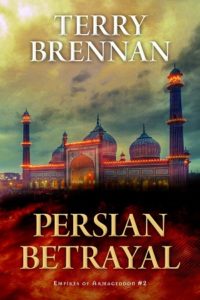The whole trilogy takes place in a short time span. Does that make it harder or easier to write the series?
Both. Confining the majority of the trilogy’s plot structure to a relatively compact span of time built a world that—for me—remained vibrant, alive, and active throughout the writing process and limited the amount of research necessary. On the negative side, because of the worldwide stage upon which the trilogy plays out (over a large number of time zones), the significant cast of characters, and the rapid shifts in action from one locale to another, keeping the scenes in the correct order was a challenge.
For each book, I created an Excel spreadsheet outline/timeline for myself that tracked the date and time for each scene. I also included the time stamp in the book with each change of scene to help orient the reader. Each line of my spreadsheet also included a short, descriptive sentence about of what happened in each scene, so if I had to move scenes around, they were still in sequential order.
Still, there were several instances where I got into a significant bind. Squeezing that much action into a short time span was certainly arduous.
The prologue shares a fictional retelling of Moses and the battle against the Amalekites from Joshua’s perspective. Is the inclusion of this story tied to the prophecies central to the story line of the series?
I don’t think it gives anything away too soon, but one portion of the second prophecy is deciphered to read “. . . when the sons of Amalek are invited to the king’s banquet . . .” In the Bible, following the battle of Rephidim—where Moses’s arms are kept raised by Aaron and Hur while the Israelite army routs a much larger army of Amalekites—Moses tells Joshua that God spoke, “I will completely blot out the name of Amalek from under heaven.”
Historically, it is a widely held belief that the nomadic tribes known as Amalek were the descendants of Ishmael, Abraham’s illegitimate son by Hagar. These tribes became the Bedouin nomads who eventually populated vast stretches of the desert on both sides of the Red Sea and are now known as Arabs.
The enmity between Arabs and Jews (the sons of Jacob) has continued for centuries. Within my story, when Israel signs a peace treaty, known as the Ishmael Covenant, with Saudi Arabia, Egypt, Jordan, and the Arab states along the Persian Gulf, that covenant can certainly be interpreted as Amalek being “invited to the king’s banquet.”
In Persian Betrayal, that line, and other lines in the Vilna Gaon’s second prophecy, are a prophetic warning to the nation of Israel—one that may be too late to heed.
How do the spiritual themes of the series such as spiritual warfare carry through in Persian Betrayal?
 From the time the Vilna Gaon, a Jewish Talmudic genius, wrote two prophecies in 1794, relentless forces of evil arrayed against him to destroy the prophecies and prevent them from fulfilling their purpose. Those forces of evil were created, eternal beings—fallen angels. To protect the Gaon and the prophecies, angels from the throne room of God were dispatched to join the battle, a battle waged both in the heavenly realms and also on the earth.
From the time the Vilna Gaon, a Jewish Talmudic genius, wrote two prophecies in 1794, relentless forces of evil arrayed against him to destroy the prophecies and prevent them from fulfilling their purpose. Those forces of evil were created, eternal beings—fallen angels. To protect the Gaon and the prophecies, angels from the throne room of God were dispatched to join the battle, a battle waged both in the heavenly realms and also on the earth.
In the Bible, the book of Ephesians references “heavenly realms” five times and refers to the battle “against the rulers, against the authorities, against the powers . . . against the spiritual forces of evil in the heavenly realms.”
In this series, our protagonist, Brian Mullaney, is drawn into this conflict against desperate evil forces who want to change the end of the Bible with an earthly battle that has eternal consequences. My NIV Study Bible has a note on Ephesians 1 that reads, “The spiritual struggle of the saints here and now is not so much against ‘flesh and blood’ as against the great spiritual forces that war against God in heaven.”
The spiritual warfare in Persian Betrayal is real, personal, dangerous, and frightening to our characters. And its outcome has eternal ramifications. Not so much different than today.
Click thru to continue!


